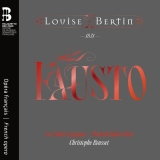Die französische Komponistin Louise Bertin (1805-1877) war in den Schallplattenkatalogen bisher eine Abwesende. Und doch hat sie bemerkenswerte Kompositionen geschaffen. Sie vertonte 1831, noch zu Goethes Lebzeiten, die erste französische Faust-Oper auf ein eigenes italienisches Libretto. Dieses Werk wurde 1831 unter dem Titel Fausto am Pariser Théâtre Italien uraufgeführt. Die Komponistin war zu Lebzeiten angesehen. Hector Berlioz widmete ihr seine Les nuits d’été und Franz Liszt transkribierte die Oper La Esmeralda für Klavier.
Dass ihre nach der Uraufführung schnell von den Spielplänen verschwundene Fausto-Oper jetzt wieder zu neuem Leben erweckt wurde, ist ein wichtiges Unterfangen, und wenn man sich die Oper anhört, kann man ob der musikalischen Kraft, die von ihr ausgeht, nur staunen.
Da ist zuerst einmal die sehr auffällige Orchestrierung, ungemein farbig und prägnant. Da es sich um eine Opera semi seria handelt, gibt es viele Rezitative mit Fortepiano-Begleitung, und daneben großartige Ensemblenummern sowie durchaus attraktive Solo-Arien.
Dass dies alles so wirkungsvoll und, ja, begeisternd wird, ist Christophe Rousset zu verdanken, der mit viel Verve dirigiert und sein Orchester, die Talens lyriques, und den Flämischen Rundfunkchor zu Höchstleitungen anspornt.
Fausto ist insofern ungewöhnlich, als die Titelrolle sowohl von einem Tenor als auch von einem eine Oktave höher singenden Sopran gesungen werden kann: ferner gibt es sogar eine Version für Alt. In dieser Aufnahme singt die Sopranistin Karine Deshayes den Faust, und sie tut das dramatisch engagiert. Ich hätte trotzdem vorgezogen, einen Tenor zu hören.
Karina Gauvin singt eine tadellose Marguerite, und dem kroatischen Bass Ante Jerkunica gelingt eine exzellente Darstellung der Mephisto-Rolle.
Aufs Ganze gesehen, ist dies eine hervorragende Aufnahme, die man nur empfehlen kann.
Ausführliche Einführungstexte sowie das Libretto in drei Sprachen vervollständigen den guten Eindruck dieser Produktion.
The French composer Louise Bertin (1805-1877) has been absent from record catalogs until now. And yet she created some remarkable compositions. In 1831, while Goethe was still alive, she set the first French Faust opera to her own Italian libretto. This work was premiered in 1831 under the title Fausto at the Théâtre Italien in Paris. The composer was highly regarded during her lifetime. Hector Berlioz dedicated his Les nuits d’été to her and Franz Liszt transcribed her opera La Esmeralda for piano.
The fact that her Fausto opera, which quickly disappeared from the repertoire after its premiere, has now been revived is an important undertaking, and when you listen to the opera, you can only marvel at the musical power that emanates from it.
First of all, there is the very striking orchestration, incredibly colorful and concise. As this is an opera semi seria, there are many recitatives with fortepiano accompaniment, as well as magnificent ensemble numbers and thoroughly attractive solo arias.
It is thanks to Christophe Rousset, who conducts with great verve and spurs his orchestra, the Talens lyriques, and the Flemish Radio Choir to top performances, that all this is so effective and, yes, enthralling.
Fausto is unusual in that the title role can be sung by both a tenor and a soprano singing an octave higher; there is even a version for alto. In this recording, the soprano Karine Deshayes sings Faust, and she does so with dramatic commitment. I would still have preferred to hear a tenor.
Karina Gauvin sings an impeccable Marguerite, and the Croatian bass Ante Jerkunica gives an excellent portrayal of the Mephisto role.
Overall, this is an outstanding recording that can only be recommended. Detailed introductory texts and the libretto in three languages complete the good impression of this production.






















